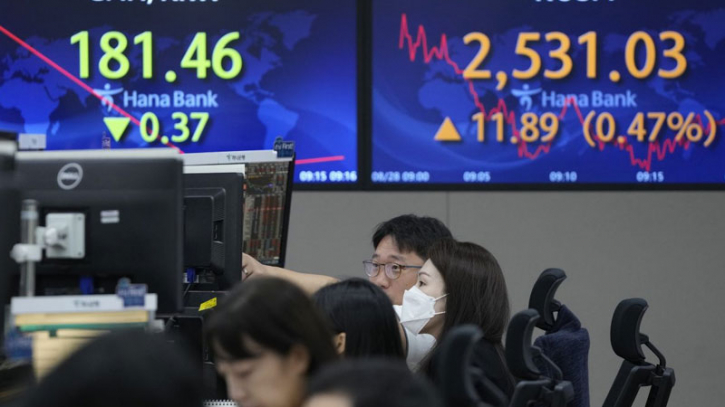Asian markets jump on global rally ahead of key US data

Asian markets extended a global rally Tuesday ahead of US data this week that could be key to the Federal Reserve's decision-making on interest rates.
However, worries over China's economy continue to dampen sentiment, with authorities facing growing calls to introduce a huge stimulus to revive the stuttering post-Covid recovery.
After a painful August on trading floors, investors have enjoyed a positive start to this week, with Federal Reserve boss Jerome Powell's insistence that monetary policy would be based on a range of indicators fuelling hope the tightening cycle has drawn to a close.
This week sees the release of the US central bank's preferred gauge of inflation, the personal consumption expenditures (PCE) price index, as well as jobs creation and factory activity.
"The trio should tell investors where critical factors in the Fed's decision tree on rates lie following the central bank's gathering in Jackson Hole last week and ahead of a scheduled meeting in September," said Stephen Innes at SPI Asset Management.
While inflation is easing, Fed officials have warned it remains too high at 3.2 percent -- well above their two percent target -- and that borrowing costs might have to rise or at least remain elevated for until they are satisfied prices have been tamed.
That, however, has led to concerns that they could deal a blow to the economy.
Anthony Saglimbene, at Ameriprise, said: "Investors want to see economic releases this week that suggest activity is slowing enough to keep further rate hikes at bay, but not too slow to indicate the economy is headed for a recession."
In early trade Tuesday, Asian markets were up across the board.
Hong Kong climbed more than one percent thanks to a surge in tech giants, while Tokyo, Sydney, Seoul, Singapore, Taipei and Jakarta were also up.
China stimulus hopes
Shanghai rose again, helped by China's weekend decision to slash the stamp duty paid on stock trades for the first time in 15 years as leaders try to revitalise the beleaguered market.
However, observers say equities are unlikely to recover until the government announces a wide-ranging "bazooka" support package like the $550 billion doled out in 2008.
"The measures over the past weekend are not enough to stem the downward spiral" and their impact will be short-lived if further help for the economy is not forthcoming, said Ting Lu, at Nomura Holdings.
"Without additional and more aggressive policy stimulus, these stock-markets-focused policies alone have little sustainable positive impact."
Those sentiments were echoed by Alvin Tan, head of Asia FX strategy at RBC.
He said in a note: "It's becoming obvious that much more significant stimulus, particularly from the fiscal side, will be needed to change the bearish outlook on mainland markets, including the renminbi."
Hopes for a softer reading on jobs and inflation weighed on the dollar, which slipped against its main peers, though the yen remains weighed by the Bank of Japan's refusal to move away from its ultra-loose monetary policy.
Goldman Sachs strategists warned that if the BoJ sticks to its guns, then the yen could fall to around 155 per dollar over the next six months, which would be its weakest since 1990.
.png)




